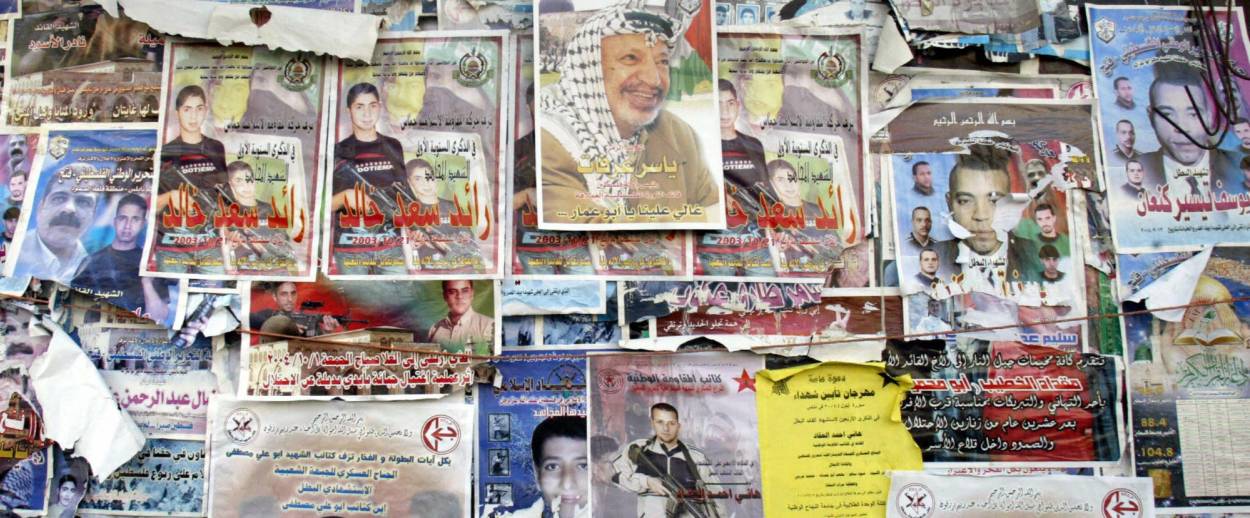Why Palestinian Payments to Convicted Militants Are Likely to Continue, No Matter What Congress Does
The Palestinian Authority’s assistance program provides essential economic aid to countless impoverished families




When Congress returns to work in early September, pro-Israel activists will seek to put the Taylor Force Act high on the Senate and House agenda.
The legislation, passed by the Senate Foreign Relations Committee in August, would cut off all direct economic aid to the Palestinian Authority (PA)—which last year was about $300 million—with the exception of its funding for East Jerusalem hospitals. The reason? To compel the Palestinian Authority to stop handing out stipends to convicted militants who carried out attacks on Israelis and foreigners, like the March 2016 Palestinian stabbing attack that killed Taylor Force, a U.S. Army veteran.
On its face, there is a compelling reason for the bill. Why should American taxpayers give aid to an authority that subsidizes payments to killers and their families? The Senators and pro-Israel activists asking this question say these payments incentivize violence, especially for young Palestinians with personal problems who know that, if they attack Israelis, their families will be taken care of by the Palestinian Authority.
It’s tough to peer deep into every individual attacker’s psyche, and in some cases the payments may help Palestinian militants rationalize their actions. However, lost in that argument is that the main reason Palestinians cite to justify violence is Israel’s punitive occupation. And more importantly, the public debate about the legislation, and the prisoner payment program, has been devoid of crucial context. No lawmaker has shown an iota of interest in exploring why it is that the payments to Palestinian prisoners and their families exist—and why the bill will likely fail in its goal of getting the PA to stop the payments.
The Palestinian leadership is detested by a good chunk of Palestinians who live in the West Bank (the only place where the PA, in major population areas, has control). PA President Mahmoud Abbas is seen as corrupt, authoritarian, and worst of all, a collaborator with the Israelis on security, which results in Palestinian security forces arresting militants intent on carrying out attacks against Israeli soldiers and civilians. Because of this cooperation, Palestinians see their security forces as subcontractors for the Israeli occupation, barred from protecting civilians from Israeli settler attacks but compelled to crack down on violence against their occupiers.
But the prisoner payment program is one of the most popular PA programs, and it would be political suicide for the PA to halt it. To understand why, you only have to set foot for five minutes in Palestinian cities like Ramallah and Jenin, where posters featuring young men, some of them armed, some of them not, adorn walls and buildings. These are Palestine’s “martyrs,” as Palestinians call them, and to West Bankers and Gazans, they are freedom fighters slain in the just struggle against Israeli occupation and domination. It matters little whether they threw a stone, were shot at a protest, or carried out a shooting or stabbing attack—they are resisters all the same in the eyes of Palestinians, and hold a hallowed place in Palestinian society.
There’s another reason why the prisoner payments are so important to Palestinians: they are a crucial economic safety net in a society strangled by Israeli occupation and plagued by an Israeli system of mass incarceration that has locked up thousands of Palestinian men since 1967, when Israel conquered and then occupied East Jerusalem, the West Bank and Gaza.
When a Palestinian is killed or arrested and thrown in Israeli jail, the Palestinian leadership pays a stipend to their family, in addition to payments to Palestinian prisoners themselves for use in Israeli prison-run canteens. (The families of those killed get $350 a month as a base payment, with additions for someone’s spouse or children. Allocations for Palestinian prisoners range from $350 to over $2,000, depending on how long they are in jail.) For families where the breadwinner is in jail or dead, this is economic aid that helps raise a family, either through direct payments or the canteen cash that eases the family’s burden of assisting their brethren in jail.
But in Congress, the political context for these payments is missing from the debate. Prominent voices in that debate, like Senators Bob Corker and Lindsay Graham, remain fixated on the notion that the payments are a reward for Palestinian violence—as if that violence is divorced from the struggle against Israeli occupation, and as if subsidizing violence is the reason why the payments continue.
Corker and Graham seem to have no desire to understand the political roots of the prisoner payment program. In Washington, that’s not a surprise. Voices that can credibly explain Palestinian society and politics are missing on Capitol Hill.
But the absence of those voices is a disservice to the debate over Israel/Palestine in America. There is a political context to everything in Israel/Palestine, and divorcing the context from the fact of Palestinian violence is a surefire way to never understand why, as Palestinian official Jibril Rajoub told the Israel Policy Forum in April, the PA believes it has “a social responsibility to the families of prisoners, no matter why he is in jail.” If American policymakers ever want to make progress towards resolving the Israeli-Palestinian conflict, a knowledge of Palestinian politics is key. They can start by reading up on the political roots of the prisoner payment program.
Related: The Senate’s Foreign Relations Committee Just Took a Big Step to Curb Palestinian Terrorism
Alex Kane is a New York-based freelance journalist who writes on U.S. foreign policy, Israel/Palestine, and civil liberties. His work has appeared in The Intercept, The Nation, Vice News, and more. Follow him on Twitter @alexbkane.